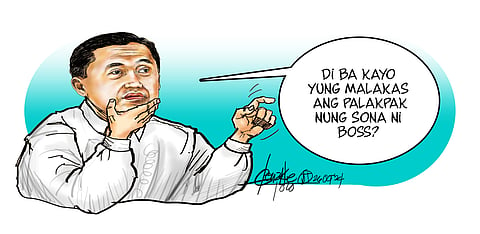
- NEWS
- the EDIT
- COMMENTARY
- BUSINESS
- LIFE
- SHOW
- ACTION
- GLOBAL GOALS
- SNAPS
- DYARYO TIRADA
- MORE

Watching the public hearings of the so-called Quad Committee of the House of Representatives feels like viewing a telenovela, where the main actors leave the audience hanging with the promise of future surprises. The proceedings ooze with hypocrisy, as many of those taking the lead roles in the probe were once staunch defenders of the anti-narcotics program of former President Rodrigo Duterte.
Senator Christopher “Bong” Go, who was Duterte’s confidant and former Special Assistant to the President (SAP), had a reason to remind some of the probers about their stance on the campaign they helped fund. “During the six State of the Nation Addresses of the former president, whenever he mentioned the war on drugs, Duterte was given a standing ovation. Now, why is he being blamed for a lot of things? Didn’t they benefit from it?” Go’s cryptic message to the House probers questioned.
The “Quadcom,” composed of the Dangerous Drugs Committee led by Surigao del Norte 2nd District Representative Ace Barbers, the Human Rights Committee headed by Manila 6th District Representative Bienvenido Abante, the Public Accounts Committee led by Abang Lingkod Representative Caraps Paduano, and the Public Order and Safety Committee chaired by Santa Rosa, Laguna Representative Dan Fernandez, initially inquired into the Philippine Offshore Gaming Operators (POGO) scandal but eventually shifted the focus to the war on drugs.
In a moment of contrition, Representative Acop acknowledged that “both the public and elected officials stayed quiet about the rampant drug killings for too long.” However, he seemed to be referring to his peers, as independent surveys showed strong public support for Duterte’s anti-drug drive and his approach to it.
Acop, who chairs the House Committee on Public Order and Safety and is a former police officer, pointed out that fear and the president’s high approval ratings prevented most legislators from opposing the campaign.
One of the many hypocrisies highlighted in the hearings was Abante blaming voters for electing “leaders and public officials who violate human rights.” He stated, “So for the next elections, let’s not vote for those who don’t care about human rights, those who don’t have compassion, those who don’t follow due process of law,” which came across as a self-serving statement.
Acop reiterated that the drug war deaths could not be blamed solely on the government, noting that the country’s leaders are democratically elected. “We also can’t say only our leaders are to blame. It’s also our fault because they wouldn’t have been in power if we didn’t vote for them.”
Abante defended the loyalty shown by House members to Duterte’s all-out war on drugs, saying that the support did not extend to extrajudicial killings (EJKs). He claimed that the billions of pesos approved by the House for the campaign were not meant for the killing of “suspected drug users, pushers and especially innocent civilians.”
Abante tried to justify the support of Congress by stating that the goal was “to end the threat posed by illegal drugs, not to cut short the lives of innocent men, women and children.”
Here lies the duplicity in the language used at the Quadcom, as previous congressional hearings on the war on drugs — featuring allegedself-confessed assassins Edgar Matobato and Arthur Lascañas — concluded that many of the allegations, including those about the Davao Death Squad and state-sanctioned EJKs, were fictional.
Duterte had warned from the start that many would die in the war on drugs, as he intended to stir up the drug industry, leading to syndicates either fighting each other or silencing informants.
Abante now claims that the “bloody drug war” of the Duterte administration failed to solve the drug problem, even after admitting that he and his peers supported it for six years.
In an effort to cover up the House’s sellout, he pointed the finger at the media: “Media outlets were silenced, and those who opposed the drug war — such as lawyers, judges and politicians — were implicated in illegal drugs.”
Rather than providing clarity to the public, the Quad Comm hearings seem more like a series of campaign ads on national TV, gearing up for next year’s elections.
